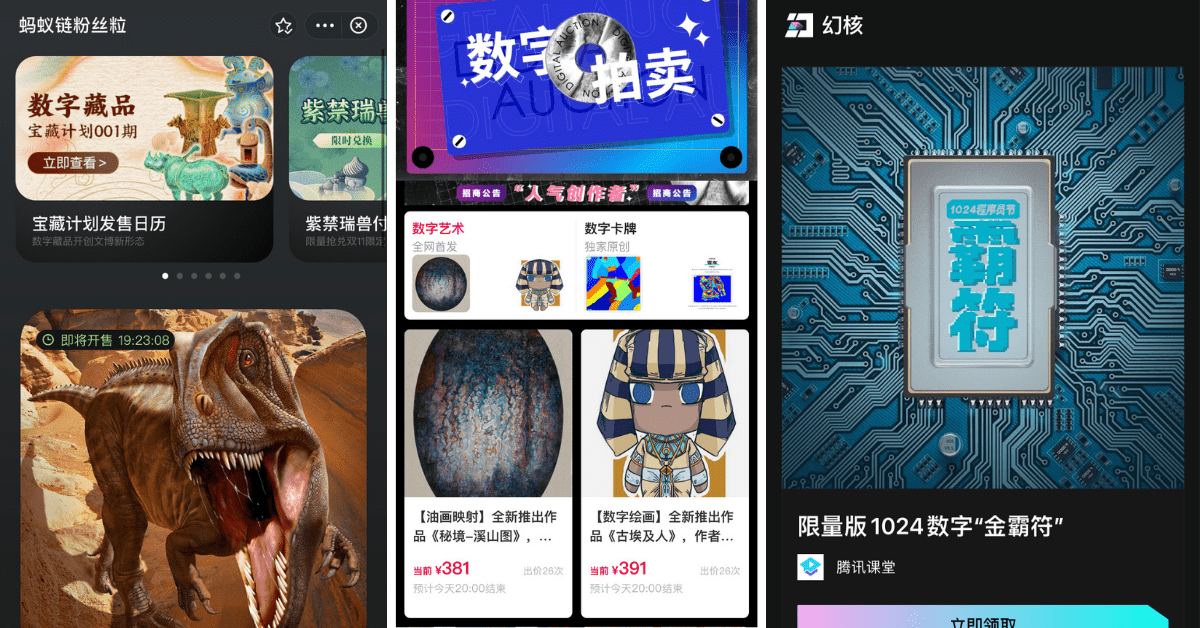Chinese tech conglomerates Alibaba and Tencent have recently rebranded their non-fungible token (NFT) features and instead changed their references to “digital collectibles,” against the backdrop that multiple Chinese state media agencies have blatantly criticized NFTs.
Alipay, a mobile payment app that is ubiquitous in China and run by Alibaba’s fintech affiliate Ant Group, has changed the name of the NFT collections on its platform to digital collectibles.
Alipay has been actively rolling out NFT artworks built on its own AntChain. For example, in June and August, it sold NFT wallpapers for its payment interface, and last month it even created NFTs featuring the torch of the 2022 Asian Games.
In July, Alibaba’s online marketplace Taobao also sold NFTs in partnership with Near Protocol, a blockchain-based development platform, in its annual Taobao Maker Festival.
To address concerns surrounding its rebranding move, AntChain said on Monday in a statement that it conducts its business around digital collectibles in strict compliance with laws and regulations.
“AntChain sets strict standards to carefully select the content of digital collectibles, requires real-name authentication for buyers to minimize fraud risk, and only allows digital collectibles to be freely gifted between authenticated Alipay users after they have been held by one of them for more than 180 days,” AntChain said, adding that it firmly opposes price speculations around NFT products.
Meanwhile, Huanhe, an NFT app Tencent launched in August, has also removed NFT references from the app.
“Huanhe is a fully compliant platform that prohibits the transfer of digital products between users, requires all users to use their real name, and has robust internal risk controls,” a Tencent’s spokesperson told Forkast.News in an email response, adding that it does not tolerate any illegal activities, including those related to cryptocurrencies.
While the tech giants in China have embraced the idea of NFTs, or now “digital collectibles,” they have refrained from offering re-selling features for users amid regulatory concerns.
Although NFTs are not included in China’s recent stepped-up ban against cryptocurrency-related activities, the country’s state media have expressed strong concerns over the new form of digital collectibles. Last month, Securities Times, a sister paper of the People’s Daily, published an opinion piece to criticize NFTs as hype and suggested the digital assets should serve the real economy by tokenizing actual assets.
Earlier this month, Chinese government-aligned newspaper Guangming Daily also published an opinion article to criticize NFT hype, saying it is “definitely not good for the healthy development of NFT.”
Notably, the Guangming Daily article praised Alibaba’s blockchain arm AntChain’s stance on NFT mania, when AntChain last month removed an NFT bidding item from Alibaba’s auction platform Ali Auction after the bid price once went through the roof to 3.149 million yuan (about US$490,000). AntChain said at the time: “We firmly oppose all forms of digital collection hype, and resolutely resist any form of illegal activities in the name of digital collection, which are actually virtual currency-related activities.”
However, the criticism from state media did not seem to scare away JD.com, another Chinese e-commerce giant. JD.com has been giving away free NFTs featuring its mascot to those who sign up for its annual technology conference JD Discovery, according to its social media post published last week.
The JD.com NFTs were minted on the tech giant’s own blockchain JD Zhizhen chain (智臻链). The company said the free NFT airdrop represented its first step to “test the water” in the NFT field, as it works to develop its own blockchain technology and further apply NFT technology in areas including copyright protection, public welfare, art collection and e-commerce.





